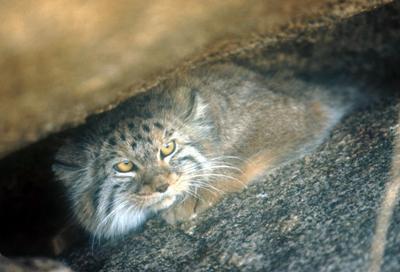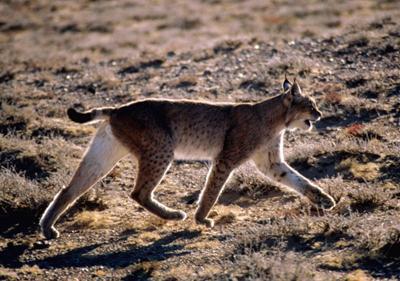James Murdoch
The aim of our Rufford Small Grants project is to evaluate the ecological impacts of hunting in the grassland and semi-desert steppes of Mongolia.

Pallas’ cat (Otocolobus manul). Pallas’ cats (or manul) occur throughout the reserve and are hunting for their skins and body parts. Live animals are also sold to international markets. © Richard P. Reading.
The grassland and semi-desert steppes of Mongolia harbour a unique group of carnivores that include corsac and red foxes (Vulpes corsac, V. vulpes), Pallas’ cats (Otocolobus manul), badgers (Meles meles), and wolves (Canis lupus). In recent years, hunting of these species has increased dramatically and caused large-scale declines in many areas. The increase is due to high demand for animal products in international markets, limited hunting regulations and law enforcement, and a lack of protective measures.

Eurasian lynx (Lynx lynx) near the Ikh Nartiin Chuluu Nature Reserve. Lynx occur throughout the arid grasslands of Mongolia and face heavy persecuted by livestock herders. © Steve Cain.
The impacts of hunting remain largely unknown and need to be understood to effectively conserve steppe carnivores. Our main goals are to:
1) Investigate the direct effects of hunting on carnivore abundance. We estimate carnivore abundance using spotlight surveys and distance sampling methods in hunted and non-hunted areas each season. These surveys are important for understanding how carnivore populations respond to hunting pressure and how well the reserves protect each species.
2) Evaluate the indirect effects of hunting on prey communities. Small mammals and other prey are surveyed regularly and compared with carnivore abundance and diet. Understanding how prey populations respond to carnivores helps us determine the importance of carnivores in maintaining healthy ecosystems.
3) Assess the magnitude of hunting. We interview herders and local communities to determine harvest rates, habitats and species most at risk, socio-economic factors driving hunting, and attitudes to wildlife conservation. Our interviews provide important information that will help us develop realistic solutions to over-hunting and poaching.
4) Launch a carnivore monitoring programme. The programme will train herders in wildlife census techniques, monitor carnivore and small mammal population trends, and increase awareness about illegal hunting. The programme also aims to improve law enforcement efforts and advocate for greater protection of wildlife.